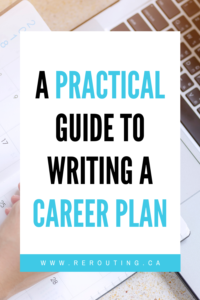
A Practical Guide to Writing A Career Plan
Whether you are a student, a new graduate, or someone who has been out in the workforce for a while, creating a career plan is essential to help you achieve your goals. Yes, you can find your path by accident, but you can also plan it intentionally. In this blog post, I will provide you with the steps you can and should take to plan and develop your career. I’ll also take you through strategies to help you achieve your career goals. It all starts with writing a career plan.
Disclosure: This post may contain affiliate links, meaning ReRouting Inc. gets a commission if you decide to make a purchase through links posted on this site, at no cost to you. Please read this disclosure for more info.
I spent years asking myself…
Am I doing all the right things to help me get to where I want to go?
Having a clear path forward can help you feel organized and you can rest assure that you are working towards a clear career goal. This post is not just for students and new grads, it also applies to anyone who is looking to establish a career development plan.
Working as an HR Professional, I help employees create career development plans. What I have observed in coaching employees in my corporate job, and clients in my private practice is that people who have established specific short and long-term goals, with actionable steps to achieve those goals are more successful in finding the jobs they strive for.
I’m not saying that you can’t wing it. You can and people do all the time. Some people are also happy just going with the flow and seeing where life takes them (career-wise) and that is cool! But, if you want to be intentional or you want to feel less stressed about the trajectory of your career then writing a plan is the way to go!
Here is what I will go through in this post:
- Determine what you want to do – What job do you aspire to have?
- Identify what credentials, knowledge, skills, and abilities you need
- Make a list of what you currently have (credentials, experience, skills, etc.) and identify what you are missing
- Develop an action plan to obtain the credentials, experience, skills, etc. that you need to get
Determine What You Want to Do
This may be the hardest task for those looking to launch their career or transition to a new career path. Especially when you don’t even know if you’ll like working in the career you are planning for. This is often the struggle for students, new grads, and those looking to exit their current job and head in a completely different direction. But, this is probably the most important task in writing a career plan.
Or it can be simple, you might be able to say I currently work as a Graphic Designer within a marketing department and I want to become a Social Media Specialist.
Either way, the first step in writing a career plan is determining what you want to do. If you don’t know what you want to do then there are some different means to help you determine your path.
Here are some ideas to help you decide what career path to follow:
-
- Taking a career or work personality test is a great place to start if you need some direction. Even if you have been in the workforce for years and are struggling to find a career you feel happy in, a career test can be beneficial. The test that I refer clients to is CareerFitter.
- Working with a career coach can help you uncover jobs that you wouldn’t have considered on your own and they can provide you with straightforward feedback. They will get to know you, your objectives, and help you find something you’ll be happy and successful in.
- Job shadow. You don’t have to be a student to shadow professionals in their careers! Ask your HR department or Manager if you can shadow someone within your organization. Let them know what you are interested in and ask if there would be an opportunity to learn more about what they do. And, if you are a student, reach out and ask a professional if you can job shadow them.
- Schedule an informational interview. Informational interviews provide a great opportunity to learn more about professions and career paths. Set up an interview with a professional working in a field you are interested in and ask them questions about their job, the pros and cons, and any other inquiries that will help you decide what you want to do.
- Read books – there are so many great books out there that can help you find your way!
- Take a look at this post 3 Secrets to Help You Discover Your Career Path and Find Your Life’s Purpose
Once you have decided what you want to do, then it’s time to start looking into what credentials, experience, knowledge, skills, and abilities you’ll need to get there.
Identify What Credentials, Experience, Knowledge, Skills, Abilities, etc. You Need to Work in Your Desired Job(s)
So, you have figured out what you want to do. Now you need to focus on what you’ll need to get there. How do you find out what you need? There are a few ways and I suggest you use a compilation of all my suggestions. Yes, I have said ALL these suggestions. Why should you do all of them? It’s my opinion that this will give you a well-rounded idea of what’s required. If you only do one, you might not get all the information required to help you create your plan with action steps to get there.
To identify what is required to land your dream job you are going to first start by searching jobs online, then you’ll speak with someone working in that field, and, if possible, you’ll check in with a hiring manager, recruiter, or HR professional who works within the field.
Search Online Job Boards
 First, start with searching for the job title you aspire to on an online job board. Find 8-10 jobs with that title. If you are not selective of the industry you want to work in, then get a broad range of industries for your selected job descriptions.
First, start with searching for the job title you aspire to on an online job board. Find 8-10 jobs with that title. If you are not selective of the industry you want to work in, then get a broad range of industries for your selected job descriptions.
For example, if you want to work as a Marketing Specialist, pick job descriptions from a broad range of industries (healthcare, retail, banking institutions, etc.). By researching various industries you’ll be able to get a good idea of how requirements can change depending on the industry. If you only want to work in Marketing within the retail industry, then try to find as many Marketing Specialist (or job titles that closely match) within the retail industry. Go through your 8-10 job posts and pull out the credentials, knowledge, skills, and abilities required in the job description. Review the entire job description, not just the qualifications or job requirements section. Sometimes the details you are looking for can be found within the responsibilities as well.
For example, a Marketing Manager job posting I just found had this in its position responsibilities…
“Plan and manage seasonal and bi-annual marketing budget with analysis on return-on-investment and profit-loss projections.”
…but said nothing about managing a budget within the desired skills and experience section!
I can tell you that a candidate who has experience managing a budget, analyzing ROI & PLP’s with all of the other requirements will likely be more successful through the job application process than those who don’t. Look for the hidden gems of knowledge and skills that you find in the job responsibilities section.
You might be sitting there thinking, they didn’t include it because they are willing to train someone on that? Yes, you are right. They might! But, during resume screens, a recruiter will hold on tighter to an applicant’s resume who already has those qualifications under their belt – assuming they meet all the other requirements. They want to put the best candidates forward to the hiring managers they work with. Therefore, they will want to match a candidate’s resume closely with job descriptions.
This is what you are going to do with those 8-10 job postings…
Okay so you have 8-10 job postings to review, now create separate lists for each one highlighting what you’ll need to be successful in THAT job. Use the sample chart below as a guide to help you breakdown the job(s). If there is a specific job within a company that you already work for that you aspire to work in, then seek out that job description.
Example) Marketing Specialist
| Education | · Bachelor’s degree in marketing, business, business management, or a related field |
| Experience | · 5 years of experience developing marketing campaigns, marketing strategy, and plan execution
· Marketing agency experience considered an asset |
| Transferable Skills | · Analytical
· Project Management · Communicate clearly and concisely · Attention to detail |
| Specialized Skills | · Media planning and buying
· Plan, develop, manage, and monitor social media channels such as Instagram, Twitter, LinkedIn, digital marketing campaigns, SEO/SEM, newsletters, and videos |
| Training | |
| Certifications | · Google AdWords Certification
· Google Analytics Certification · Facebook Blueprint |
| Abilities | · Adapt to change
· Collaborate cross-functionally |
To break it up, so everything is clear, and you can cross-reference the 8-10 job postings, place the information in a chart. If you need help identifying what transferable and specialized skills are? This blog post 50+ Job Skills to Include on Your Resume and How To Incorporate Them, will help clarify the difference between them!
Once you have all of them completed, I suggest you print them all out. You can use these as a reference later. But most importantly, you are going to go through all of them and look for the commonalities and also some of the unique expectations certain industries/positions may ask for.
Now, from your 8-10 job postings, create one list…
One list of what you need education, experience, credentials, certificates, skills, etc. you need to land your dream job or put you on the career path you are intentionally planning for.
Keep it. Hang it up where you do your best work. Paste it in your planner. Add it to your career vision board. Place it anywhere to remind yourself of what you are working towards!
We will get back to what you will do with this list shortly!
Speak with Someone Currently Working in That Field (Job)
First, do the research then reach out to a professional working in the field to cross-reference your findings (from job postings) and their insight as to what may be required to work in the field. Use what you have found through your search as talking points and ask them to clarify and validate what they believe is significant and how they got started in the profession.
Speak with a Recruiter, HR Professional, or Hiring Manager
If you already work in an organization and are looking to change jobs or get promoted as part of your career plan, speak with the hiring manager within the department you’d like to work in. Also, the Human Resources Department (assuming there is one) for assistance in creating a career development plan.
If you are looking for a career move, are a student, or are currently unemployed then try to connect with technical recruiters or HR professionals on LinkedIn that are familiar with the industry or type of position you are interested in. Like for example, I can help an Engineer write a targeted resume, but in terms of career planning and path opportunities, this would be out of my domain. By speaking with someone who knows the industry would be of better benefit!
Try to Do ALL 3!
The idea here is that you are going to look for consistencies to ensure you have the correct information. Now that you have done your research and you know what is required to work in the job or career path you are striving for…
You can identify what you need to work on obtaining to help you along your career path! This is absolutely a key component when writing a career plan.
What’s Missing?
So, now you have that one list where you have identified what you need to be able to land the job you aspire to work in. Now, take a realistic inventory of your credentials, experience, skills, certificates, etc.
Take that one final list you created and start preparing a checklist of what you are currently missing.
Do you have any of the transferable skills they are asking for?
What specialized skills are required?
Will you have to upgrade your education?
Is there a need to take any additional training courses?
Are you required to have a designation or certification?
Do you have the abilities requested?
Are there any experience requirements that you need to obtain?

Check-off what you currently have…
Place a checkmark on what you have and highlight the items you need to work on. Ensure you are realistic when completing an inventory of your current fitness to perform the job.
I have worked with clients in job search strategy sessions where we are looking at job descriptions for positions that they are interested in applying for – only for them to realize they aren’t qualified for the job. As we go through the posting they say “yes, I have that skill”. When we do a mock interview and I and ask them to provide me with an example to validate the skill, they quickly come to realize that they might not be able to validate it to an employer in an interview. Be honest with yourself. One of the most frustrating things that can happen is when you are not honest with yourself and place something on your resume and then don’t get job offers after interviewing.
Now, you can create action steps to get you there!
Create Your Action Plan
So now you know what you need to obtain that dream job and you have identified what you are currently missing to be a successful candidate. You are now going to take the list of what you need to work on obtaining and develop an action plan.
Realistically identify:
- How you are going to achieve what is required
- Any financial impacts – cost of training programs/ education, taking an entry-level role when making a career change, etc.
- A timeline – when you will complete the smaller steps to achieve progress and some of the larger steps.
It is easy to say something like…
I need to take a course in “xyz”. This can be done within a couple of months through a college online course. Cost is minimal. Meh, I’ll figure it out as I go…
What I have observed is that without putting concrete action steps in place, people are less likely to obtain their goals. Take the time and start writing a career plan!
If for example, you need to take a digital marketing course, here are some action steps you could take.
- Identify what training level is required. Do you need a college or university level course, degree, or diploma? Can you take a course through a continuing education program or a two-day seminar?
- Research and list exactly where the courses are offered
- What local or online programs are available?
- Look at how long the programs are (to help you establish timelines)
- Compare costs of the training programs
- Register for program
- Start program on mm/yyyy
- Complete program by mm/yyyy
If for example, you need to obtain project management experience, here’s a suggestion of action steps you can take.
- Talk to my manager about developing project management skills
- Establish a personal goal to have practiced and gained project management experience by <date mm/yyyy>
- Take the lead on a project, representing your department and requiring the cross-collaboration of various departments, stakeholders, vendors, customers, etc.
- Complete project
- Collect feedback from your manager and project collaborators to see if there is anything you can improve on to further develop your project management skills
When you recognize what you need to do to land your dream job and create actionable steps, you’ll be more successful in reaching the goals you strive for.
Career Development
This practical guide to writing a career plan can be used at any stage of your career. If you are a student trying to find your place in the workforce or trying to determine your major in school, this process will help you determine how to find what you’d like to do and exactly how to achieve it. It can also be used for a new grad who is starting their job search to launch their career.
You can use this same strategy to develop short and long-term career goals. So, if you are currently a recent Marketing Grad working as an Assistant at a marketing firm and your goal is to be the Director of Marketing within the retail industry one day – then do the work to understand what is required to meet each milestone to work towards that career goal.
Separate the plan into incremental development opportunities. Identify what a typical path would look like to one day become the Director of Marketing
Here is an example (not necessarily an actual trajectory) …
Marketing Assistant -> Marketing Specialist -> Marketing Manager -> Director of Marketing
Determine what is required at each step as you progress through your career. By doing the groundwork and identifying what credentials, experience, knowledge, skills, abilities, etc. are required to perform your dream job – you’ll be more successful in reaching your career goals.
In Summary
This practical guide to writing a career plan will help you crush your career goals. Here are the steps that you need to take to develop your plan!
- Identify what job(s) you strive for – jobs because you can include short-term and long-term career goals.
- Identify what credentials, experience, knowledge, skills, abilities, etc. you’ll need in the short-term and long-term.
- Make a list of what you currently have (credentials, experience, skills, etc.) and identify what you are missing
- Develop an action plan to obtain the credentials, experience, skills, etc. that you need to get
As you start completing all of the job requirements, you know that you are ready to start applying for jobs and progressing your career down the path you have developed!
Now start writing your career plan!




